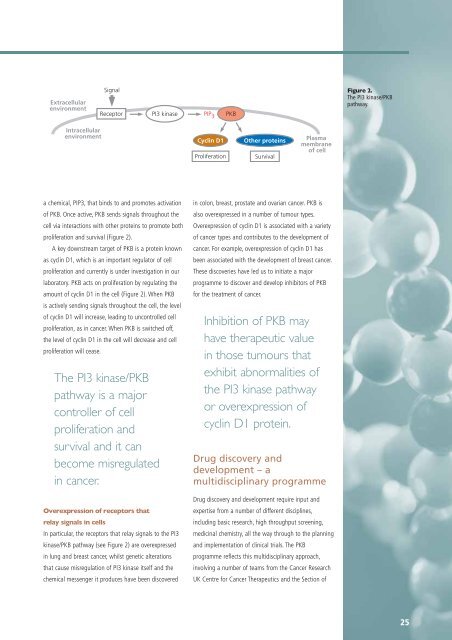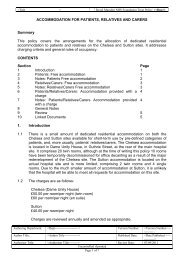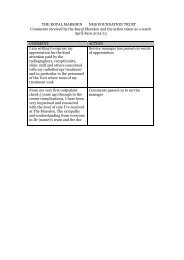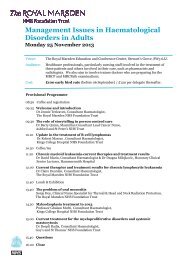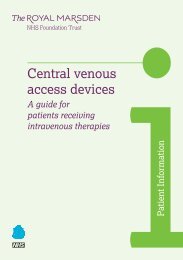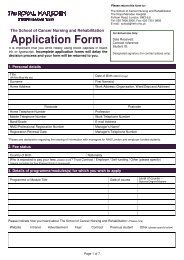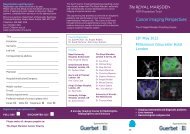Joint Annual Research Report 2004 - The Royal Marsden
Joint Annual Research Report 2004 - The Royal Marsden
Joint Annual Research Report 2004 - The Royal Marsden
You also want an ePaper? Increase the reach of your titles
YUMPU automatically turns print PDFs into web optimized ePapers that Google loves.
Extracellular<br />
environment<br />
Signal<br />
Receptor PI3 kinase PIP 3 PKB<br />
Figure 2.<br />
<strong>The</strong> PI3 kinase/PKB<br />
pathway.<br />
Intracellular<br />
environment<br />
Cyclin D1<br />
Proliferation<br />
Other proteins<br />
Survival<br />
Plasma<br />
membrane<br />
of cell<br />
a chemical, PIP3, that binds to and promotes activation<br />
of PKB. Once active, PKB sends signals throughout the<br />
cell via interactions with other proteins to promote both<br />
proliferation and survival (Figure 2).<br />
A key downstream target of PKB is a protein known<br />
as cyclin D1, which is an important regulator of cell<br />
proliferation and currently is under investigation in our<br />
laboratory. PKB acts on proliferation by regulating the<br />
amount of cyclin D1 in the cell (Figure 2). When PKB<br />
is actively sending signals throughout the cell, the level<br />
of cyclin D1 will increase, leading to uncontrolled cell<br />
proliferation, as in cancer. When PKB is switched off,<br />
the level of cyclin D1 in the cell will decrease and cell<br />
proliferation will cease.<br />
<strong>The</strong> PI3 kinase/PKB<br />
pathway is a major<br />
controller of cell<br />
proliferation and<br />
survival and it can<br />
become misregulated<br />
in cancer.<br />
Overexpression of receptors that<br />
relay signals in cells<br />
In particular, the receptors that relay signals to the PI3<br />
kinase/PKB pathway (see Figure 2) are overexpressed<br />
in lung and breast cancer, whilst genetic alterations<br />
that cause misregulation of PI3 kinase itself and the<br />
chemical messenger it produces have been discovered<br />
in colon, breast, prostate and ovarian cancer. PKB is<br />
also overexpressed in a number of tumour types.<br />
Overexpression of cyclin D1 is associated with a variety<br />
of cancer types and contributes to the development of<br />
cancer. For example, overexpression of cyclin D1 has<br />
been associated with the development of breast cancer.<br />
<strong>The</strong>se discoveries have led us to initiate a major<br />
programme to discover and develop inhibitors of PKB<br />
for the treatment of cancer.<br />
Inhibition of PKB may<br />
have therapeutic value<br />
in those tumours that<br />
exhibit abnormalities of<br />
the PI3 kinase pathway<br />
or overexpression of<br />
cyclin D1 protein.<br />
Drug discovery and<br />
development – a<br />
multidisciplinary programme<br />
Drug discovery and development require input and<br />
expertise from a number of different disciplines,<br />
including basic research, high throughput screening,<br />
medicinal chemistry, all the way through to the planning<br />
and implementation of clinical trials. <strong>The</strong> PKB<br />
programme reflects this multidisciplinary approach,<br />
involving a number of teams from the Cancer <strong>Research</strong><br />
UK Centre for Cancer <strong>The</strong>rapeutics and the Section of<br />
25


